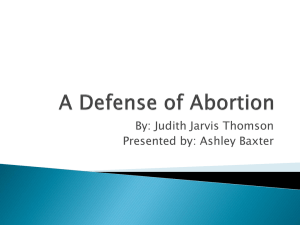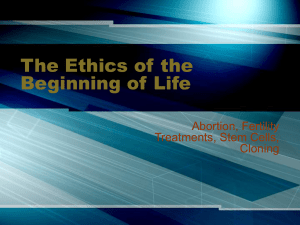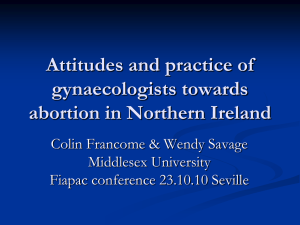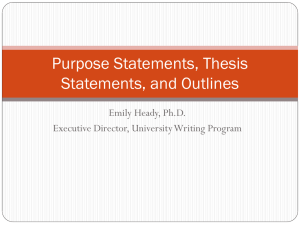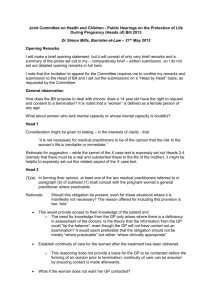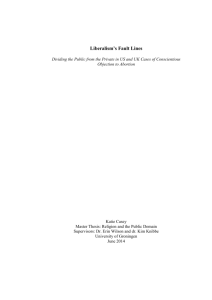Anna Walsh – Conscientious objection by health care
advertisement
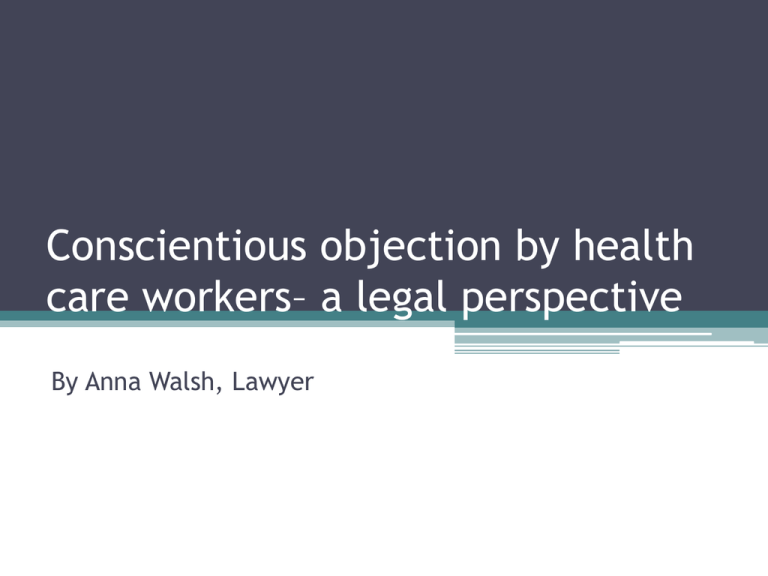
Conscientious objection by health care workers– a legal perspective By Anna Walsh, Lawyer Aims • Explain the basis for conscientious objection for HCW • Examine relevant legislation and key terms for interpretation • Clarify the law in NSW • Discuss ‘participation’ scenarios for HCW and legal cases on point • Consider employment issues Conscientious objection • International Covenant on Civil and Political Rights 1966 ▫ “Every person has a right to freedom of thought, conscience, religion and belief….” • Areas of practice affecting HCW where conscientious objection have been/could be raised: ▫ Abortion ▫ Euthanasia and assisted suicide Abortion laws in Australia • A fetus is not a “legal person” • A legal fiction has been created in order to deal with the legal status of the fetus • All states and territories have their own laws on abortion • It is not correct to say that abortion is available on demand in Australia • It is correct to say that abortion is lawful in all jurisdictions of Australia in certain circumstances Abortion laws • Criminal statutes ▫ NSW, QLD, SA, TAS, • Specific health legislation ▫ VIC, WA, ACT, NT, SA, TAS (presently a bill) • Common law ▫ NSW, QLD Available for Gestational Age any reason? Limit Obligation to Maternal Physical Fetal disability consult with and Mental a second Health doctor No Yes No No No Up to 20 weeks No No No Yes No No No No No After 20 weeks Yes Yes Yes Yes Yes No TA Yes, up to 24 After 24 weeks weeks No No Yes Yes No NT No Up to 14 weeks Yes Yes Yes 14 to 23 weeks No Yes No After 23 weeks No Only, if lifesaving No treatment NSW ACT WA VIC QLD No No No Yes No SA No No Yes Yes Yes Abortion: Victorian position • A registered health practitioner has the right to conscientiously object to giving advice, being asked to perform, direct, authorise or supervise an abortion • But there is as statutory obligation on the registered health practitioner to refer a woman who requests advice on a proposed abortion on to another practitioner who does not have a conscientious objection to abortion (refer = provision of contact details) • Registered medical practitioners and registered nurses have a statutory duty to assist in performing an abortion in an emergency situation • An emergency is defined as being where it is necessary to preserve the life of the mother Abortion: Tasmanian position • Reproductive Health (Access to Terminations) Bill 2013 - any health care practitioner has the right to conscientiously object to participating in abortion • But there is a statutory obligation on the registered health practitioner to refer a woman who requests advice on a proposed abortion on to another practitioner who does not have a conscientious objection to abortion (refer = provision of contact details) • Registered medical practitioners and registered nurses have a statutory duty to assist in performing an abortion in an emergency situation • An emergency situation is described as where it is to save the life or prevent serious physical injury of the mother • Penalties apply – professional sanctions for HCP and fines for counsellors What does it mean to ‘participate’? • Triaging an emergency that leads to an abortion? • Dispensing medications used for abortion? • Performing radiological investigations or tests used in performing an abortion? • Conveying patient undergoing an abortion to theatre? • Disposing of the fetus and cleaning the instruments used in abortion? • Paperwork in admitting patients ? • Co-ordinating staff and preparing rosters for HCW who perform/assist in abortions? Doogan and Wood v NHS Greater Glasgow and Clyde Health Board 2013 • Midwives employed in hospital, labour ward co-ordinators • Previously expressed CO to participating in abortion • Labour ward started to admit patients for abortion • Lodged a grievance with their employer – grievance rejected • Appeal to Board – appeal rejected Doogan and Wood v NHS Greater Glasgow and Clyde Health Board 2013 • Went to Court – case rejected at first instance ▫ “Nothing they have to do as part of their duties terminates a woman’s pregnancy.. ▫ They are sufficiently removed from direct involvement as, it seems to me, to afford appropriate respect for an accommodation of their beliefs.” Doogan and Wood v NHS Greater Glasgow and Clyde Health Board 2013 • Appeal lodged with Court of Appeal – won ▫ “In our view the right of conscientious objection extends not only to the actual medical or surgical termination but to the whole process of treatment given for that purpose…. ▫ The right is given because it is recognised that the process of abortion is felt by many people to be morally repugnant.” Janaway v Salford Health Authority 1988 UK • Doctor’s receptionist and secretary • Asked to type a letter of referral for an appointment with consultant for purpose of abortion • Plaintiff refused to type on basis that she was against abortion and claimed she was entitled to refuse based on conscientious objection as per section 4(1) Abortion Act 1967 UK • Personnel officer refused to acknowledge objection and sought • Plaintiff refused unless afforded protection – sacked Janaway v Salford Health Authority 1988 UK • P appealed to the Health Authority Appeal Tribunal – dismissed • Applied for judicial review – dismissed • Court of Appeal - affirmed dismissal • House of Lords – reviewed meaning of word “participate” ▫ “On proper construction the word participate in section 4(1) … is its ordinary meaning referred to actually taking part in treatment administered in a hospital or other approved place” Possible outcomes - If someone dies or is injured by an alleged failure of HCW to participate in an abortion where they conscientiously object … • Coronial Inquest • Criminal charges • Breach of duty of care Employment issues • Australian Human Rights Commission and Fair Work Commission’s anti-discrimination jurisdictions are attribute specific • Question: Is conscientious objection an attribute? • Relief from religious discrimination is recognised in legislation • If you are dismissed because you exercised your conscientious objection, the issue will be whether you contravened a lawful and reasonable direction of your employer – a vexed issue Legal steps to take • See a lawyer specialising in employment law • Or speak with your union representative (if member) to get some initial legal advice • The lawyer will take your statement, review your contract of employment, collate and review any documentary evidence and advise you on your options. • You will usually be charged for this work. • The lawyer may be able to negotiate with your employer or provide other options but this will depend on the circumstances.


